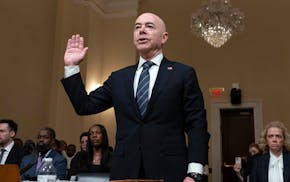WASHINGTON - Amid the raw feelings of Thursday's House hearings on domestic Islamic radicalization, Rep. Keith Ellison could not fight back the tears.
As he told the story of Mohammed Salman Hamdani, a Muslim paramedic killed in the Sept. 11 terrorist attacks a decade ago, the Democratic congressman from Minneapolis choked up and spoke haltingly of how some tried to "smear" Hamdani because of his faith.
"His life should not be identified as just a member of an ethnic group or just a member of a religion," Ellison said, "but as an American who gave everything for his fellow Americans."
The emotional testimony from the first Muslim member of Congress came as Hamdani's mother looked on silently. The moment showcased the deep sensitivities underlying the hearing, which came amid tight security, protests and bitter complaints from civil rights and Muslim groups who feel their faith is being singled out.
But one counterpoint to Ellison's criticism of the GOP-led hearings came from Abdirizak Bihi, a Minneapolis activist whose nephew, Burhan Hassan, was among some 20 Somali youths who disappeared after being recruited by a jihadist group in their native land.
"We regret the silencing and intimidation faced by leaders and activists who dare speak out on the real challenges that keep our youth and community vulnerable to radicalization," Bihi told the Homeland Security Committee. "Burying our heads in the sand will not make this problem go away."
Bihi and others affected by domestic radicalization were brought in to testify by congressional Republicans to help make their case that Muslim leaders in the United States need to do more to confront Islamist-inspired extremism and violence.
"Their courage and spirit will put a human face on the horror which Islamist radicalization has inflicted and will continue to inflict on good families, especially in the Muslim community, unless we put aside political correctness and define who our enemy is," said Rep. Peter King, R-N.Y., the committee chairman.
Feeding a story line that's become cable news fodder for the past week, Ellison took on the role of witness in order to directly challenge King, who began promoting the hearing in December.
While acknowledging the threat of violent extremism, Ellison accused the committee of "stoking fears about entire groups for a political agenda." He and other Democrats on the committee argued for a broader inquiry into potential terrorist threats, from the Ku Klux Klan to right-wing militias and environmental extremists.
Unique threat cited
King called Islamic radicalization a unique threat, citing the statements of a number of Obama administration officials, including deputy national security adviser Denis McDonough, a Minnesota native. McDonough said earlier this week that Al-Qaida and its adherents are attempting to "recruit and radicalize people to terrorism here in the United States."
Bihi, director of the Somali Education and Social Advocacy Center in Minneapolis, illustrated that by telling the story of his nephew being recruited to Somalia by Al-Shabab insurgents. The youth was killed in Somalia in 2009.
Bihi said his mosque's leadership and Muslim groups like the Council on American-Islamic Relations (CAIR) discouraged the families of the missing youths from talking to the FBI. He called it "intimidation in its worst form."
"His allegation is false," CAIR-Minnesota spokeswoman Lori Saroya said in an e-mail. "As a civil rights organization, our primary role was to educate the community on their constitutional rights, specifically the right to remain silent and the right to an attorney when law enforcement approaches. Our policy has been to cooperate with law enforcement, but protect yourself when you do."
Cravaack weighs in
CAIR also came under attack from Republican Rep. Chip Cravaack of Minnesota, who sits on the Homeland Security Committee. He questioned the Democrats' star witness, Los Angeles County Sheriff Leroy Baca, about his department's interaction with CAIR and other Muslim groups.
"You are aware this is a Hamas and Muslim Brotherhood entity," Cravaack said, in one of the more theatrical confrontations of the day-long hearing.
"No I'm not aware of that," Baca replied.
"Basically, you're dealing with a terrorist organization," Cravaack continued, citing an FBI report from a 1993 meeting of Hamas members and a pair of CAIR founders. "They might be using you, sir, to implement their goals."
"If the FBI has something to charge CAIR with," Baca replied testily, "bring those charges forward and try them in court."
Cravaack also used the hearing to call for efforts to counter what he described as the threat of sharia or Islamic law in the United States. The idea was endorsed the day before by a handful of conservatives, including Rep. Michele Bachmann, R-Minn., who signed a letter to colleagues promoting a book called "Shariah: The Threat to America."
Amid the tensions stirred by the hearing, Bihi said he was returning home to Minneapolis with no fear of recrimination. "Since I've spoken to the American people, I am not afraid," Bihi said. "I feel better than I did before."
Kevin Diaz is a correspondent in the Star Tribune Washington Bureau.
Democrats clear path to bring proposed repeal of Arizona's near-total abortion ban to a vote
Biden is off on details of his uncle's WWII death as he calls Trump unfit to lead the military
North Carolina university committee swiftly passes policy change that could cut diversity staff
Trump lawyers say Stormy Daniels refused subpoena outside a Brooklyn bar, papers left 'at her feet'
